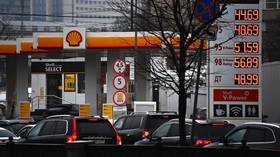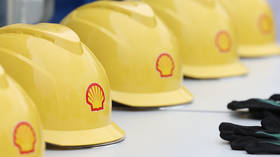Oil giant is leaving Russia

British oil company Shell announced on Tuesday its decision to “withdraw from its involvement in all Russian hydrocarbons” over Moscow’s attack on Ukraine saying it would immediately cease all spot purchases of Russian crude oil.
Shell became the latest in the ever-growing list of the foreign companies announcing their departure from the Russian market since the military offensive started on February 24.
“Shell plc (Shell) today announced its intent to withdraw from its involvement in all Russian hydrocarbons, including crude oil, petroleum products, gas and liquefied natural gas (LNG) in a phased manner, aligned with new government guidance,” the company said in a statement.
It said that, in line with this decision, it will not only stop all spot purchases of Russian crude oil but will also shut “its service stations, aviation fuels and lubricants operations in Russia.”
The oil giant went even further, saying that its previous decision to purchase 100,000 metric tons of flagship Urals crude from Russia last week was a mistake. On March 6, Shell apologized for the purchase, reportedly carried out at a record discount, announcing plans to donate the profits to a fund that helps Ukrainian refugees.
“We are acutely aware that our decision last week to purchase a cargo of Russian crude oil to be refined into products like petrol and diesel – despite being made with security of supplies at the forefront of our thinking – was not the right one and we are sorry,” Shell CEO Ben van Beurden said, making a pledge to work with aid partners to determine where the profit money from the ‘unfortunate’ purchase are best placed “to alleviate the terrible consequences that this war is having on the people of Ukraine.”
The company admitted that changing its crude oil supply chain “could take weeks to complete and will lead to reduced throughput at some of our refineries.”
A “phased withdrawal” from Russian petroleum products, pipeline gas and LNG also is “a complex challenge,” Shell said.
“Changing this part of the energy system will require concerted action by governments, energy suppliers and customers, and a transition to other energy supplies will take much longer,” it stressed.
A week ago, Shell announced that it would exit its joint ventures with Russian energy giant Gazprom. That meant that the company would pull out of its 27.5% stake in the Sakhalin II liquefied natural gas facility, its 50% stake in the Salym Petroleum Development and the Gydan energy venture. The oil company also said that it would withdraw from Russia’s Nord Stream 2 gas pipeline project, in which it holds a 10% stake worth around $1 billion.
Meanwhile, on Monday, Russia’s deputy prime minister Alexander Novak said that ditching Russian oil would lead to “catastrophic” consequences for the global markets. According to Novak, energy prices might skyrocket to over $300 per barrel of oil. The remarks came after gas prices in Europe hit record highs of almost $3,900 per 1,000 cubic meters while the price of Brent crude oil surpassed $130 per barrel for the first time in a decade.
On the same day, Russia’s ruling party came up with an idea of nationalizing the production of companies announcing their departure from the Russian market during the military offensive in Ukraine. The United Russia party pledged to respond to what it called “stabs in the back” by “tough retaliatory measures.”
Moscow, which views the military attack necessary to “demilitarize” Ukraine and to protect Donbass, considers the sanctions, imposed by the West, completely unjustified. The restrictive measures, which included cutting off major Russian banks from SWIFT and freezing their foreign assets, are forcing Moscow to look for ways to minimize the damage.













